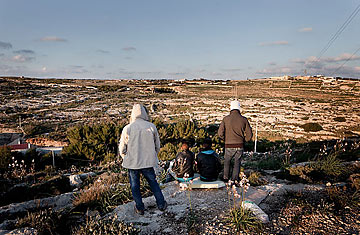
Of the thousands of migrants who have arrived in Italy in recent days, fleeing poverty and unrest in North Africa, one bears special mention. Born in an overcrowded fishing boat packed with people fleeing the fighting in Libya, he was just four hours old when he and his mother arrived on the Italian island of Lampedusa. "It's a miracle," says Tareke Brhane, a cultural mediator with Save the Children in Lampedusa. "The mother is fine. She's doing really, really well." The baby boy's parents, an Ethiopian mother and Eritrean father, named him Yeabsera, Eritrean for "God's Work."
Yeabsera is undoubtedly the youngest person to have arrived in the wave of sudden immigration that has caught Italian authorities unprepared and threatens to spark a humanitarian crisis. But he's not the only minor to have come to Lampedusa, a stretch of largely denuded rock tucked in a corner between Tunisia and Libya. According to Brhane, some 80 children under the age of five — mostly Somalis, Eritreans and Sudanese — have arrived by boat since Friday, joining some 300 to 400 young Tunisians, aged between 11 and 17. They are all part of the massive migrant influx sparked when turmoil in Tunisia and Libya lifted restrictions to emigration, and fighting and the fear of economic crisis pushed many to move. "Children need special protection," says Carlotta Bellini, a child protection manager with Save the Children in Italy. "Without being formally registered, they can't leave the island. And we are concerned that some of them might run risks of exploitation."
Italian authorities have stopped providing figures, but humanitarian workers estimate that more than 18,000 migrants have arrived in Italy by boat since the revolutions in North Africa and the Middle East began late last year. By comparison, in all of 2008, once considered a peak year, some 31,000 landed on Italy's shores. Many of the earliest arrivals have been transferred to Sicily and the Italian mainland, but in recent days the authorities have struggled to keep up with the influx. The number of migrants on Lampedusa stands at more than 6,000, dwarfing the capacity of the government's 800-bed reception center and more than doubling the population of the island.
The crisis and tension on the Italian island presents a marked contrast to the handling of Libyan refugees in Tunisia and Egypt, where the United Nations has been able to establish orderly tented cities to house the displaced. Even as Italian Prime Minister Silvio Berlusconi is scheduled to visit Lampedusa on Wednesday, and the government uses five commercial passenger ships and a military vessel to evacuate the island, aid workers worry the crisis has already reached dangerous levels. "Immigrants feel deprived of their dignity," says Laura Boldrini, a spokeswoman for the UN's refugee agency. "They've been sleeping in the open for weeks. The residents of the island feel like guests in their own house. For us humanitarian workers, it's become impossible to work. The forces of the law are gasping for air. It's bad for the image of immigrants in Italy, bad for the island, and bad for the country." On Sunday, Italian fisherman blocked the island's harbor, demanding an end to the arrivals.
Ten years of anti-immigration demagoguery by Italy's politicians have taken its toll. Even as migrants share beds or are forced to sleep outside, the government debate has centered not on how to manage the new arrivals, but on how to send them back. Italy's interior minister Roberto Maroni has threatened forced repatriations, especially for Tunisia's economic migrants, and Umberto Bossi, the leader of the Northern League, a xenophobic political party and key member of the ruling coalition, shot down a proposal by the country's foreign minister to pay migrants to go home.
Even as Italian authorities struggle to register the latest arrivals, at least 5,000 from the previous waves of migrants have been ticketed with the criminal charge of illegal immigration. "It makes no sense," says Alessandra Ballerini, a human-rights and immigration lawyer. "The penalty is a fine, money that these people just don't have. You file these charges for nothing, spend time and resources for nothing, just to show that you're cruel to immigrants?" Meanwhile, officials announced on Tuesday and the company in charge of feeding the migrants on the island had just 4,200 servings for the more than 6,000 recent arrivals.
In all this, the youngest of the migrants haven't fared much better than the general population. According to Sandra Zampa, an Italian opposition member of parliament who visited the island with Ballerini last week, more than 250 Tunisian minors have been housed for more than ten days in a museum on the island, where they've slept without mattresses, pillows or blankets, with only two bathrooms and two sinks to share among them. "How can we justify that we're participating in a military action in Libya, spending hundreds of thousands of euros a day to protect the people there, while the civilian population that arrives on our shores gets treated indiscriminately, thrown into situations that are inhuman?" asks Zampa. "And in all this we can't find space for a few hundred children?"
